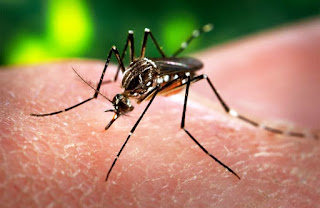Zika
What is Zika?
Zika virus is a member of the Flaviviridae virus family and the Flavivirus genus, transmitted by daytime-active Aedes mosquitoes, such as A. aegypti.
How does the virus spread?
 |
| Aedes aegipti Mosquito |
Zika virus is transmitted to people primarily through the bite of an infected Aedes species mosquito. These are the same mosquitoes that spread dengue and chikungunya viruses.
These mosquitoes typically lay eggs in and near standing water in things like buckets, bowls, animal dishes, flower pots and vases. They are aggressive daytime biters, prefer to bite people, and live indoors and outdoors near people.
Mosquitoes become infected when they feed on a person already infected with the virus. Infected mosquitoes can then spread the virus to other people through bites.
What are some of the Symptoms of Zika?
-About 1 in 5 people infected with Zika virus become ill (i.e., develop Zika).
 |
| Symptoms of Zika infection |
-The most common symptoms of Zika are fever, rash, joint pain, or conjunctivitis (red eyes). Other common symptoms include muscle pain and headache. The incubation period (the time from exposure to symptoms) for Zika virus disease is not known, but is likely to be a few days to a week.
-The illness is usually mild with symptoms lasting for several days to a week.
-Zika virus usually remains in the blood of an infected person for a few days but it can be found longer in some people.
-Severe disease requiring hospitalization is uncommon.
-Deaths are rare.
How is the virus diagnosed?
-The symptoms of Zika are similar to those of dengue and chikungunya
-See your healthcare provider if you develop the symptoms described above and have visited an area where Zika is found.
-Your healthcare provider may order blood tests to look for Zika or other similar viruses like dengue or chikungunya.
Is there any treatment for Zika virus?
-No vaccine or medications are available to prevent or treat Zika infections.
-The symptoms can be treated:
- Get plenty of rest
- Drink fluids to prevent dehydration
- Take medicine such as acetaminophen to relieve fever and pain
- Do not take aspirin and other non-steroidal anti-inflammatory drugs (NSAIDs), like ibuprofen and naproxen. Aspirin and NSAIDs should be avoided until dengue can be ruled out to reduce the risk of hemorrhage (bleeding). If you are taking medicine for another medical condition, talk to your healthcare provider before taking additional medication.
- If you have Zika, avoid mosquito bites for the first week of your illness.
- During the first week of infection, Zika virus can be found in the blood and passed from an infected person to another mosquito through mosquito bites.
- An infected mosquito can then spread the virus to other people
(Extracted and modified from : Center for Disease Controland Prevention)

Comments
Post a Comment